How to Create Your Own Accounting Software: Technologies and Cost
Accounting is increasingly automated. Learn how to build custom accounting software for your business that will reduce human error and give you a helicopter view of your finances
Accounting is an important part of any business, and the larger the company, the more challenging it is to track and manage all the finances. At some point, human brains aren’t enough to accurately and quickly calculate all the expenses and keep track of all the incoming and outgoing transactions, taxes, and legal requirements that a company’s financial records have to comply with.
Why is accounting software important? Accountants already use various accounting applications to organize their work and avoid making mistakes, as even tiny errors can lead to financial, legal, and reputational damage to a company.
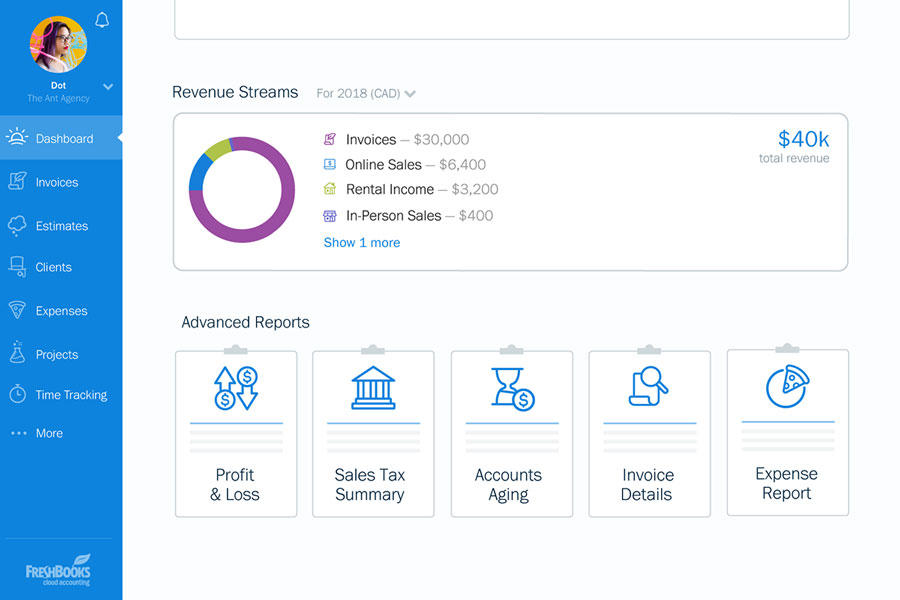
Many companies opt to use SaaS platforms for accounting, but others prefer to develop their own custom accounting software for more control, security, and customization. Some of the examples of cloud accounting software include:
- FreshBooks
- Sage
- Zoho Books
- Waveapps
- Quickbooks
These are the most popular off the shelf accounting software programs that many businesses use.
In this article, you’ll learn how to build your own custom accounting software, how much it may cost, and what key features you’ll need to develop first.
What are the benefits of accounting software?
So, how does accounting software help a business? Let’s take a look.
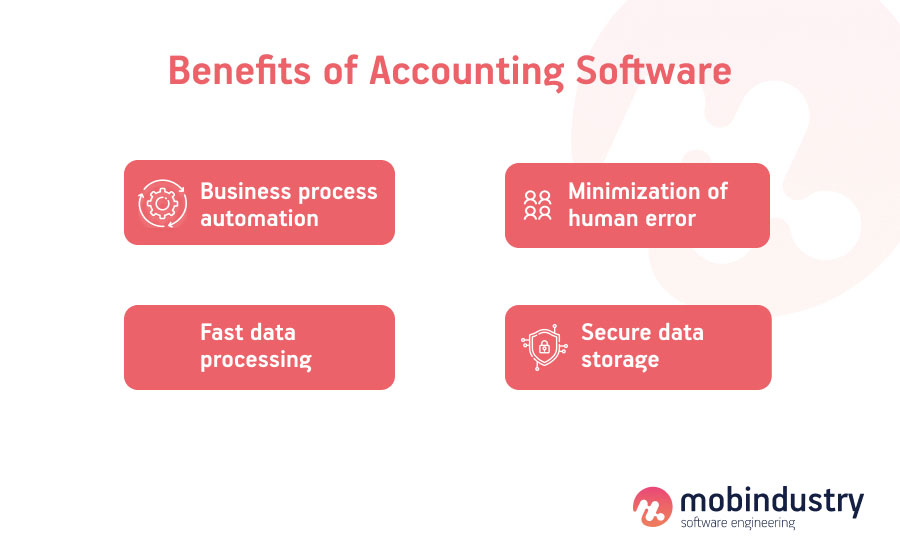
Business process automation
Automating daily accounting tasks allows you to save significant time and money. It also frees your accountants’ time for solving complex issues without having to watch over recurring issues.
Accounting software also allows you to create a workflow that makes it easy to involve new accountants without much training.
Fast data processing
Technology is way faster at processing large amounts of data than humans and can also derive insights from that data that allow management to see all important information about the current financial situation in the company.
Minimization of human error
Accounting software allows businesses to minimize human error. Even the best professional accountants sometimes make mistakes, but software performs accurate and fast calculations.
Secure data storage
Secure custom software allows businesses to store all historical data. This is not only convenient for the business but also complies with most countries’ legal requirements when it comes to storing financial data.
Types of accounting software
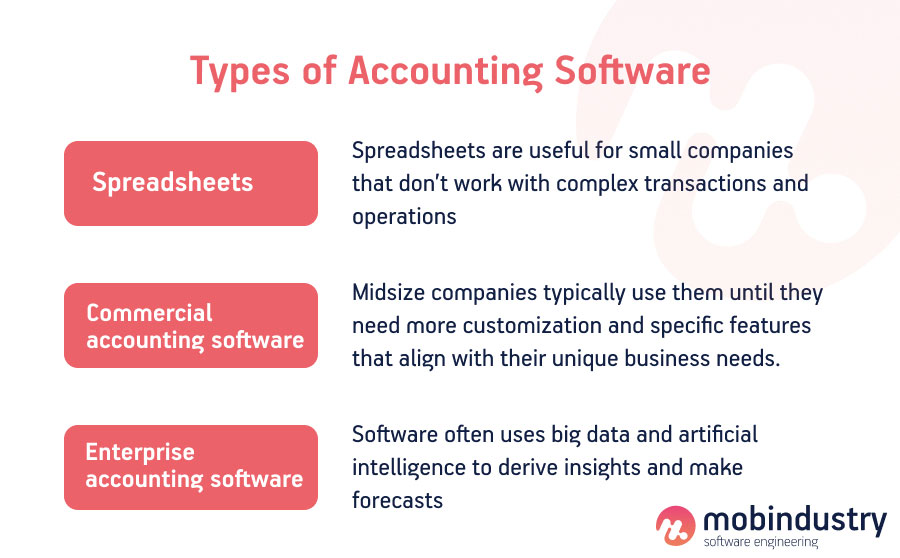
Now let’s discuss the main types of financial software systems.
Spreadsheets
Spreadsheets are what accountants have used since computers started to become popular for business purposes. They aren’t specialized accounting software, but accountants have adapted them for their work. The most famous spreadsheet software is Microsoft Excel and Google Spreadsheets.
Spreadsheets are useful for small companies that don’t work with complex transactions and operations, but once a business grows, spreadsheets are just not enough anymore.
Commercial accounting software
This is next-level software that’s developed specifically for financial management and tracking. There are lots of off-the-shelf commercial accounting software products, and midsize companies typically use them until they need more customization and specific features that align with their unique business needs.
Enterprise-level accounting software
Large companies usually require custom accounting systems that not only help manage finances but also provide analytics and monitoring of the whole corporate system across all departments.
Such accounting software often uses big data and artificial intelligence to derive insights on how the business performs financially, and it also helps to control risks and make forecasts.
Off-the-shelf software vs custom solutions
You can find off-the-shelf solutions for all the types of accounting software I’ve mentioned. Some SaaS businesses even create large and highly complex platforms for their enterprise clients.
However, ready-made solutions are still too rigid, as they have a set number of features that clients have no way to change and customize. Some of these features are simply unnecessary and clutter the interface, which makes it harder for large companies to find a universal solution for all their departments and stakeholders.
That’s why sometimes integrating a SaaS solution may be a mistake for a large company. On the other hand, they’re extremely beneficial for companies that don’t have resources to invest in their own custom software.
One of the problems of accounting software packages is that you need to pay for the features you don’t need, and you need to build your processes around features you do get. If your off-the-shelf solution is no longer suitable or available, moving to another solution may be painful, as you’re often required to adjust your business processes according to the flow the platform offers. To sum up, here are the pros and cons of off-the-shelf solutions for financial management.
- Cheaper than creating your own platform
- Get 24/7 implementation support from the vendor
- No flexibility and limited potential for customization
- Need to adapt your business processes and workflow to the given software
- No control over updates, security, or downtime
- May pay for features you don’t need
- In the long run, paying for a platform can be costly
Now let’s sum up the advantages and disadvantages of customized accounting software.
- The solution is made for your specific needs and reflects your business goals and workflow
- Onboarding and training is faster because software is built around your company’s internal processes
- You can scale your software however you want
- You’re independent from a third party and in full control of your and your customers’ data security
- Software development requires time and resources
- You’ll need to constantly maintain your software
If you choose to partner with a software development company, they will handle the maintenance as well as development. This includes updates to frameworks and libraries, bug fixes, and regular testing.
Must-have features for accounting software
The features of your web-based accounting software will depend on several factors:
- Your target audience
- Market standards
- Your business goals
- Type of accounting software
- Your budget
To accurately put together the list of features you need to succeed, you need to do research, define your target market and goals, calculate your budget, and get quotes from potential vendors. You’ll find out more details about the process of developing accounting software in the next section of this article.
For now, let’s talk about the features that are present in almost all software for accountants and that you’ll likely need to develop as well.
Invoicing
This feature should allow you to send invoices and also track invoicing history and invoice statuses to see paid, overdue, and open invoices, for example. For more automation, you might enable reminders for regular invoices.
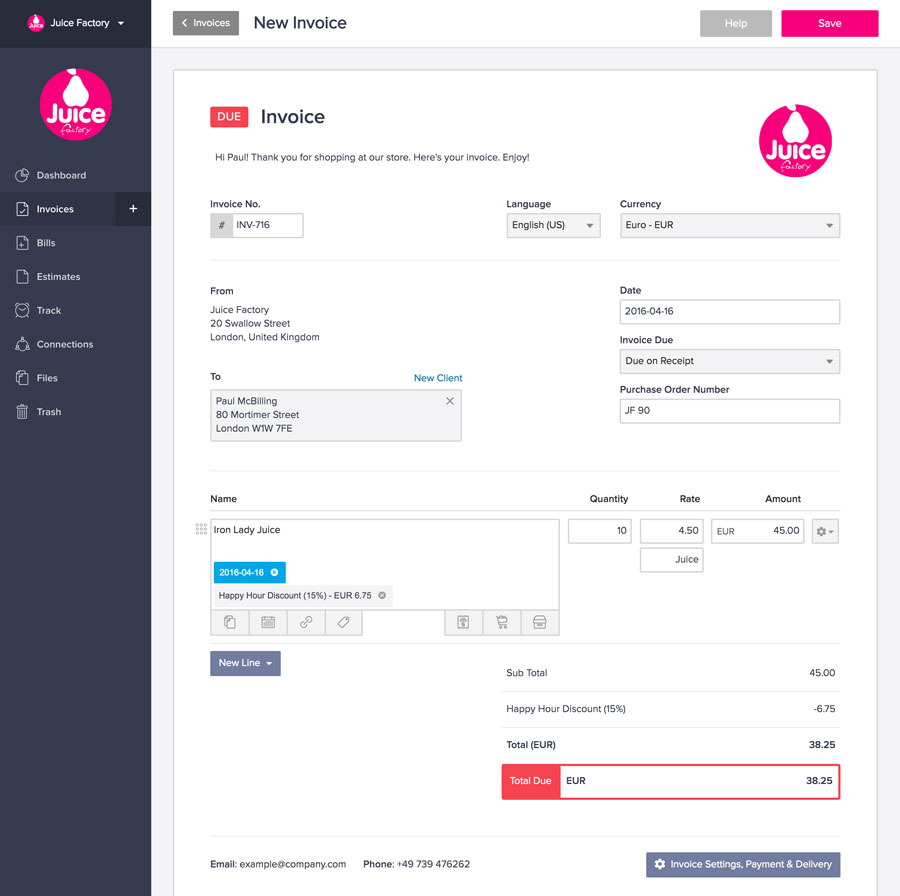
Expense tracking
Tracking expenses of different types (bank payments, receipt reconciliations, and others) should be possible in any accounting system. Your employees should be able to take and upload pictures of receipts so everything is kept in one place.
Analytics and reporting
Analytics are the brains of your accounting system — a place where you can get an overview of your business’s financial performance, compare historical data, and even make forecasts based on it.
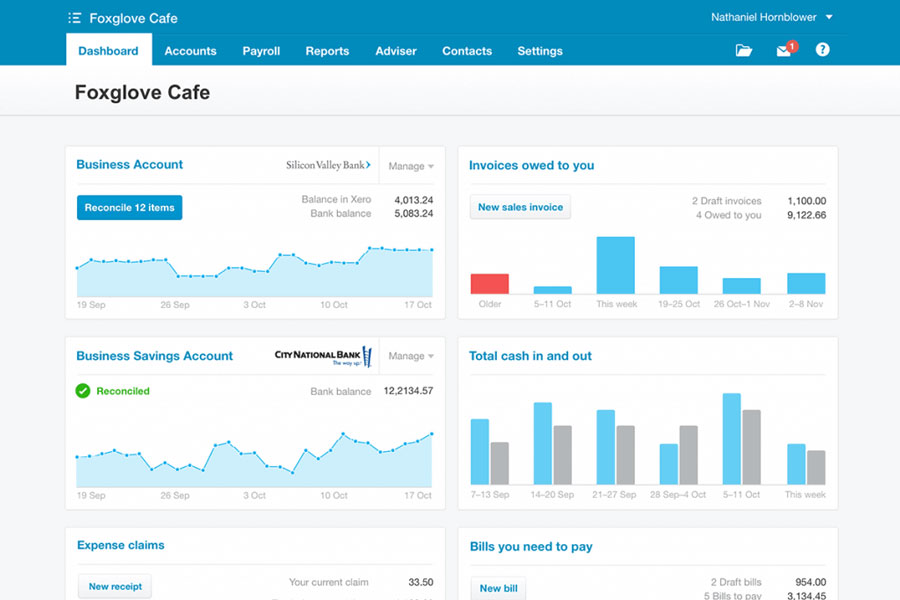
Based on analytics, you’ll be able to get accurate and clear financial reports. This is probably the most important part of any accounting software and is a pain point for most accountants.
Role management
Not all your employees will need access to all your company’s financial information. Role management in accounting software can help you provide different access to different employees. This will help you protect your company’s sensitive data.
Project tracking
Large companies have lots of projects, clients, and income streams, which is why it’s so important to implement project tracking functionality. Contractors may have different hourly rates, billed hours, statuses, and so on. With projects, you can separately estimate each project’s financial performance.
Tax calculator
Tax calculations are tricky, especially in large companies. Your accounting software should help you calculate different types of taxes, track tax periods, and avoid overdue tax payments.
Your software should support:
- Value added tax (VAT)
- Income tax
- Monthly/quarter federal taxes
- National insurance taxes
… and others.
For convenience, add common tax forms so your employees can input all data. For maximum automation, program the software to add all data to forms automatically.
Bank account integration
The ability to link your bank accounts to your accounting software is extremely important for convenience, automation, and accuracy. Your software should be able to upload electronic statements in formats like OFX, QIF, and CSV, which are the most common among banks and fintech platforms.
Payroll management
Salaries are an important part of any business’s financial life, and your software should help you process payrolls and calculate bonuses and totals to be paid, accounting for taxes and other deductions.
CRM integrations
Modern businesses often rely on multiple platforms including CRMs. Your accounting software should be able to integrate with the systems you use in order to take information from them. This simplifies the workflow and can help automate certain tasks. For example, if you use an ecommerce platform, your sales information can go directly to your accounting software to help calculate your revenue.
How to create your own accounting software
Building software for your business can take different amounts of time depending on the complexity of your project and on how you approach development. You can build your own in-house team, hire freelancers, or partner with a software development company.
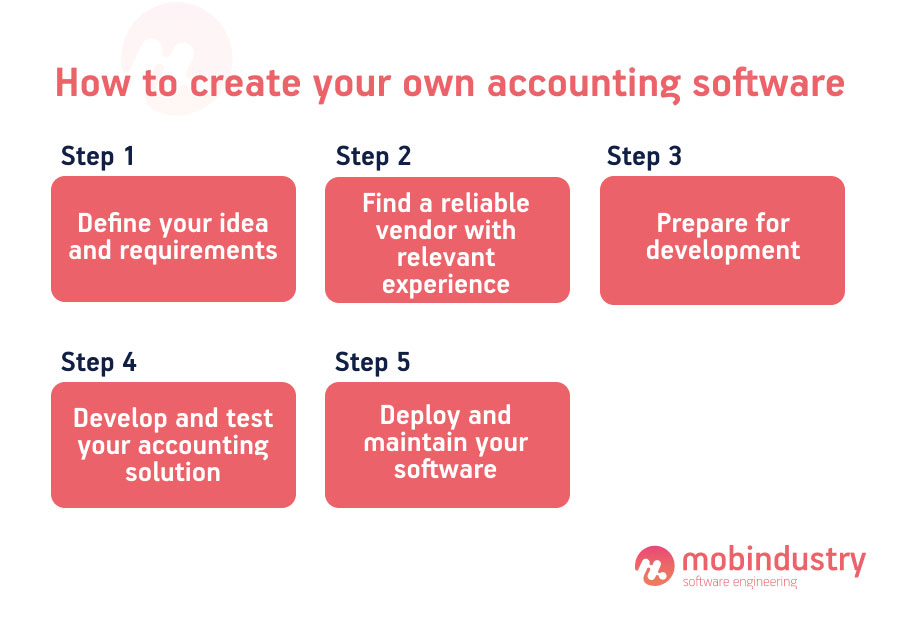
In this article, I’ll focus on how to make an accounting system with the help of a software development agency, as it’s the most cost-effective and time-saving strategy.
Step 1. Define your idea
The first thing you need to do is define your business goals and ideas for an accounting app. You don’t necessarily have to prepare a feature list for your future software. However, it’s good to have a vision, as it will help you describe your project to your vendor.
To accurately define your project idea, answer the following questions:
- What business goals should my software help achieve?
- What are the processes in my company’s accounting department that need to be optimized?
- What are similar solutions other companies use?
After answering these questions, you need to research existing software products. You can take a look at several SaaS accounting solutions and pick the features you’d like to see in your application.
Step 2. Find a vendor
A vendor for accounting software development should be able to help you with everything from conducting research to actually building the software and later maintaining it.
You can find a vendor by:
- Asking your partners and acquaintances for recommendations
- Searching popular listing websites like Clutch.co and Goodfirms for reviews
- Searching for specific content on how to build your accounting software
After the initial search, contact shortlisted vendors and ask them for quotes. To make this process more efficient, you can create a request for proposal, or you can just schedule a call with each vendor to assess their communication skills and experience. A good vendor will understand your needs, ask questions, and suggest next steps.
Step 3. Prepare for development
The preparation stage or discovery stage of development usually involves continuous communication with a business analyst, during which the vendor gets to understand your business needs and discusses possible solutions.
As a result, you’ll get a technical specification for your accounting software. A technical specification is a document that describes each part of the development process and the specifications of your software, from features to the tech stack and stakeholders.
At this stage, you’ll also get wireframes that explain your software’s business logic as well as design concepts or even a fully fledged UX design.
Step 4. Develop and test your software
After you have a clear plan for your project, it’s time to start the development process. According to the best practices of modern software development, programming and quality assurance happens almost simultaneously.
Each small part of the software developed is tested immediately. This allows you to reduce the number of software errors, optimize the development process, and save money in the long run.
At Mobindustry, we divide the software development process into sprints that can be adjusted based on your current needs. This means that although there’s a plan for developing your accounting software, it’s still quite flexible.
To release your software faster and start testing it in your business, I recommend prioritizing features and releasing an MVP first. This way you’ll be able to gather feedback from your employees and develop the accounting solution further.
Step 5. Deploy and maintain your software
After releasing your accounting software, you need to integrate it into your current business processes and train staff. Your vendor can help you with staff training by creating technical documentation for your product that will explain the features and give you an introduction to the software.
Once your accounting software is ready, you’ll still need to regularly update, review, and maintain it. At Mobindustry, we always offer maintenance that takes a set number of hours each year or quarter to run security and performance tests and update your software and all its components to the latest versions.
How much it costs to create custom accounting software
The cost of your accounting software will depend on multiple factors:
- The number and complexity of features
- Tech stack
- Design complexity
- Hourly rate of your development team
- Number of team members
To effectively create accounting software, you’ll need these team members:
- Backend developer
- Frontend developer
- Project manager
- UI/UX designer
- Quality assurance specialist
- Business analyst
- Team lead
You may need more accounting software developers to create your software faster, so the team can vary in size according to your budget and needs.

On average, accounting software takes 1500 to 2500 hours to develop, so the total development cost will depend on the hourly rate of your vendor.
The hourly rates of development companies mostly depend on their location and experience. A project that costs $100,000 to develop in the US can cost only $40,000 in Ukraine without sacrificing the quality.
Developing an accounting system costs around $35,000 to $80,000 and beyond based on the complexity. The only way to get a precise estimate is to describe and plan your project in detail, so creating a technical specification should be your first step when working with a vendor.
Final thoughts
There are dozens of ready accounting solutions available for businesses of all sizes, but many businesses at some point find that a premade system does more harm than good, restricts their internal operations, and offers unnecessary features that they still need to pay for.
To build a custom accounting solution, you need to formulate your needs and find reliable software development professionals
This makes large and midsized businesses choose to develop custom accounting software that perfectly reflects their goals and workflow. To build a custom accounting solution, you need to formulate your needs and find reliable software development professionals who offer accounting software development services. They will be able to offer you the most cost-effective development options.
If you’re interested in developing your own custom accounting software, be sure to contact us. We’ve created multiple enterprise systems for internal operations in the logistics, healthcare, and ecommerce industries.
Frequently Asked Questions
- Project scope
- Tech stack
- Feature complexity
- Team structure or collaboration model
- Developers’ hourly rates
- API integrations
- Overhead costs


